 W
WThe agora was a central public space in ancient Greek city-states. It is the best representation of a city-state's response to accommodate the social and political order of the polis. The literal meaning of the word "agora" is "gathering place" or "assembly". The agora was the center of the athletic, artistic, business, social, spiritual and political life in the city. The Ancient Agora of Athens is the best-known example.
 W
WAthenian democracy developed around the 6th century BC in the Greek city-state of Athens, comprising the city of Athens and the surrounding territory of Attica. Although Athens is the most famous ancient Greek democratic city-state, it was not the only one, nor was it the first; multiple other city-states adopted similar democratic constitutions before Athens.
 W
WThe Attic numerals are a symbolic number notation used by the ancient Greeks. They were also known as Herodianic numerals because they were first described in a 2nd-century manuscript by Herodian; or as acrophonic numerals because the basic symbols derive from the first letters of the (ancient) Greek words that the symbols represented.
 W
WThe idea of the Common Peace was one of the most influential concepts of 4th century BC Greek political thought, along with the idea of Panhellenism. The term described both the concept of a desirable, permanent peace between the Greek city-states (poleis) and a sort of peace treaty which fulfilled the three fundamental criteria of this concept: it had to include all the Greek city-states, it had to recognise the autonomy and equality of all city states without regard for their military power, and it had to be intended to remain in force permanently.
 W
WDirect democracy or pure democracy is a form of democracy in which the electorate decides on policy initiatives without legislative representatives as proxies. This differs from the majority of currently established democracies, which are representative democracies. The theory and practice of direct democracy and participation as its common characteristic was the core of work of many theorists, philosophers, politicians, and social critics, among whom the most important are Jean Jacques Rousseau, John Stuart Mill, and G.D.H. Cole.
 W
WThe ecclesia or ekklesia was the assembly of the citizens in the democratic city-states of ancient Greece.
 W
WThe Greek word "ἐλευθερία", transliterated as eleutheria, is an Ancient Greek term for, and personification of, liberty. Eleutheria personified had a brief career on coins of Alexandria.
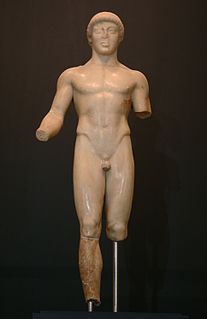 W
WEphebos (ἔφηβος), also anglicised as ephebe or archaically ephebus, is a Greek term for a male adolescent, or for a social status reserved for that age, in Antiquity.
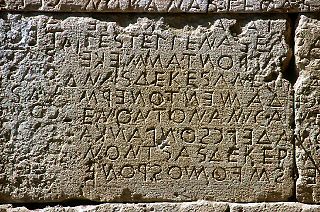 W
WAn epikleros was an heiress in ancient Athens and other ancient Greek city states, specifically a daughter of a man who had no sons. In Sparta, they were called patrouchoi (πατροῦχοι), as they were in Gortyn. Athenian women were not allowed to hold property in their own name; in order to keep her father's property in the family, an epikleros was required to marry her father's nearest male relative. Even if a woman was already married, evidence suggests that she was required to divorce her spouse to marry that relative. Spartan women were allowed to hold property in their own right, and so Spartan heiresses were subject to less restrictive rules. Evidence from other city-states is more fragmentary, mainly coming from the city-states of Gortyn and Rhegium.
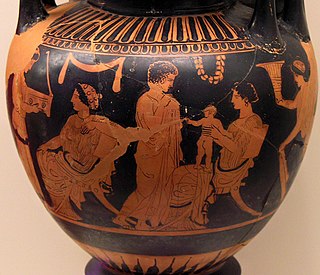 W
WIn Ancient Greece, the gynaeceum or the gynaeconitis was a building or the portion of a house reserved for women, generally the innermost apartment. In other words, a women's quarters, similar to the Indian and Muslim zenana. The gynaeceum is the counterpart to the andron, or male quarters.
 W
WThe Ionian League, also called the Panionic League, was a confederation formed at the end of the Meliac War in the mid-7th century BC comprising twelve Ionian Greek city-states.
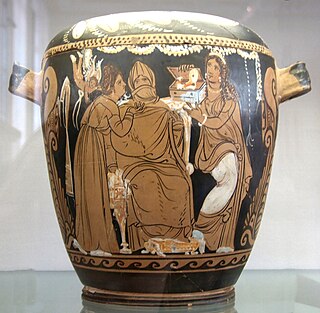 W
WMarriage in ancient Greece had less of a basis in personal relationships and more in social responsibility. The goal and focus of all marriages was intended to be reproduction, making marriage an issue of public interest. Marriages were usually arranged by the parents; on occasion professional matchmakers were used. Each city was politically independent and each had its own laws concerning marriage. For the marriage to be legal, the woman's father or guardian gave permission to a suitable male who could afford to marry. Orphaned daughters were usually married to uncles or cousins. Wintertime marriages were popular due to the significance of that time to Hera, the goddess of marriage. The couple participated in a ceremony which included rituals such as veil removal, but it was the couple living together that made the marriage legal. Marriage was understood to be the official transition from childhood into adulthood for females.
 W
WOstracism was an Athenian democratic procedure in which any citizen could be expelled from the city-state of Athens for ten years. While some instances clearly expressed popular anger at the citizen, ostracism was often used preemptively. It was used as a way of neutralizing someone thought to be a threat to the state or potential tyrant though in many cases popular opinion often informed the choice regardless. The word "ostracism" continues to be used for various cases of social shunning.
 W
WThe Panhellenion or Panhellenium was a league of Greek city-states established in the year 131–132 AD by the Roman Emperor Hadrian while he was touring the Roman provinces of Greece.
 W
WSalmacis or Salmakis was the name of a fountain or spring located in modern-day Bodrum, Turkey. According to some classical authors, the water had the reputation of making men effeminate and soft. Ovid famously recounts the myth in his story about Hermaphroditus and the nymph of the spring Salmacis.
 W
WThe trial of Socrates was held to determine the philosopher's guilt of two charges: asebeia (impiety) against the pantheon of Athens, and corruption of the youth of the city-state; the accusers cited two impious acts by Socrates: "failing to acknowledge the gods that the city acknowledges" and "introducing new deities".
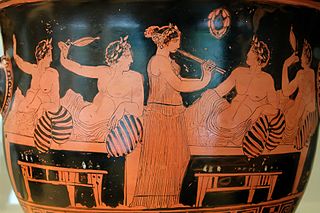 W
WIn ancient Greece, the symposium was a part of a banquet that took place after the meal, when drinking for pleasure was accompanied by music, dancing, recitals, or conversation. Literary works that describe or take place at a symposium include two Socratic dialogues, Plato's Symposium and Xenophon's Symposium, as well as a number of Greek poems such as the elegies of Theognis of Megara. Symposia are depicted in Greek and Etruscan art that shows similar scenes.
 W
WSynoecism or synecism, also spelled synoikism, was originally the amalgamation of villages in Ancient Greece into poleis, or city-states. Etymologically the word means "dwelling together (syn) in the same house (oikos)." Subsequently, any act of civic union between polities of any size was described by the word synoikismos. The closest analogy today is the incorporation of a city; in fact, "incorporation" is often used to translate synoikismos, in addition to the Latinized synoecism. Synoecism is opposed to Greek dioecism, the creation of independent communities within the territory of a polis.
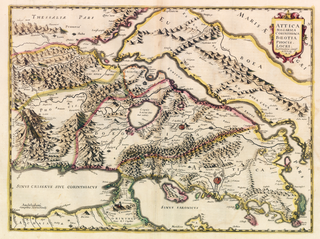 W
WThe trittyes, singular trittys were the way that population was separated in ancient Attica, and is commonly thought to have been established by the reforms of Cleisthenes in 508 BC. The name means "third", owing to the fact that there were three regions in each trittyes. There were thirty trittyes and ten tribes named after local heroes in Attica. Trittyes were composed of one or more demes; demes were the basic unit of division in Attica, which were smaller units of population.